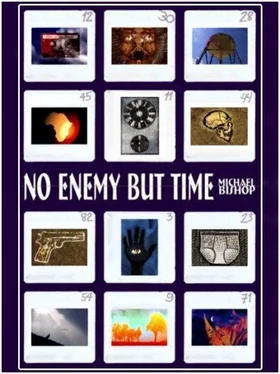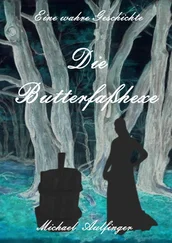The habilines, renewing their approach, stalked to within fifteen or twenty feet of me, perilously near.
Reluctantly, I unsnapped my holster, drew my pistol, and pointed it skyward. A single warning shot would probably send them scrambling for cover, but it would also set back my hopes of cementing a relationship of mutual acceptance and trust. In the face of this dilemma I began to talk, spilling out the Pledge of Allegiance, the Preamble to the Constitution, the entire text of a Crest toothpaste commercial, several nursery rhymes, and the lyrics to a goldie-oldie popular song, all in soothing, confidence-inspiring tones that I hoped would resolve the crisis in my favor. For a moment or two they listened attentively, then flashed one another a series of significant looks whose meaning—“ Attack!” —I somehow intuited.
Desperate, I began to sing. I sang in a rich, lilting tenor, and I sang with feeling:
“A day ago,
I had a lovely row to hoe.
Where did it go?
Oh, all has changed, and rearranged,
From but a single day ago…”
The sound of this plaintive melody spilling from my lips gave my attackers pause. Or maybe it was not so much the music itself—a simple ditty, heartfelt and direct—as the sheer unexpectedness of my singing it for them. Singing was even better than eating scorpions as a proof of my habilinity! Although virtually spellbound through the second refrain, my audience then began to tire of my performance. Exchanging a series of rapid glances and gestures, they resumed closing in on me. Their faces made it easy to decide what to do for an encore.
I fired my pistol.
The effect was dramatic. Three of the males fell to the ground as if I had poleaxed them, two others ran into the woods, and a sixth beshat himself and dove sideways with his arms over his head. Still in front of me, dazedly crouching, were Helen and the steadfast Alfie. In Helensburgh itself a pandemonium of shrieks and gibbering had broken out among the women and children, but this died away quickly as they hurried for shelter. With their menfolk routed, however, who would defend them? I was cutting a decidedly Genghis Khanish figure, but my assumption of this autocratic role gave me no pleasure. I had probably blown my chance of achieving a workable detente with the Minids.
Extending one hand, I took a step or two toward Helen and Alfie. They backed away. The remaining habiline males rolled over, leapt up, and hightailed it for the huts, there to make a stand if I chose to pursue them. The fellow who had lost control of his bowels oared himself backward over the grass, scraping fecal matter from his derriere, while the warriors who had run into the forest returned to see what was happening. A brave people. My pistol shot had signaled a shift in the balance of power in almost the way the explosion of an atomic device over Hiroshima had signaled a similar alteration between the Allies and the Japanese. At least, however, I had fired a warning—I had plenty of bullets.
“I’m not going to do it again,” I assured Helen and Alfie. “That was to save my life.”
But they, too, withdrew to the huts, where, among a congregation of fuddled, uncertain faces, they stared at me as if I were Death Incarnate. When I made no move to press my advantage, two or three of the males began gesticulating with their clubs, hooting belligerently, and indulging in ridiculous swagger, their hackles lifted along their shoulders and their chests puffed out.
In the thicket to my right, however, a young Minid male was scrutinizing me with almost chilling calm. He had large, limpid eyes and a professorial dignity. He and Alfie seemed more dangerous foes than the vainglorious gasbags dancing about before the huts, and I decided to get out of Helensburgh to avoid having to shed anyone’s blood.
“Goodbye,” I told them. “Look for me to make this up to you. All in all, I’m not such a bad dude. Goodbye…”
Oh, all has changed, and rearranged,
From but a single day ago…
Van Luna, Kansas
October 1964
Lyingin bed one night, Anna and John-John long since tucked in and told “sweet dreams” in the other bedroom, Jeannette tried to explain her ambivalent feelings about her hometown to Hugo, who was smoking a cigarette and desultorily following a George Raft and Ida Lupino late movie on the portable TV that sat on the chest of drawers. His cigarette smoke curled eerily in the mirror behind the set.
Hugo stubbed the cigarette in a glass ashtray with a SAC emblem in the bottom. “I am now gettin’ serious, mujer . I am now ready to tell you what the trouble is.”
“Yes?”
“The trouble is that Van Luna is not real.”
“Not real?”
“I said that, yes. Not real. Instead, Van Luna is like a spotless laboratory chamber, very clean. Good air, sweet water, pretty white mice for its population. Stick a little brown mouse in, and what’s the big difference? The white mice stay pretty, and the brown mouse gets fed and sniffed at just like everybody else. It isn’t real, Van Luna. It’s just like a laboratory chamber with little food and water bins.”
Jeannette pulled herself away from Hugo, drew up her knees, and took the ashtray from his hands.
“Little food and water bins? What are you talking about? My father has faced economic reality every day of his life in this town. It’s done things to him, too. That isn’t real?”
“Are we talkin’ about John-John or your father?” Hugo let his eyes drift back to the TV screen, where Ida Lupino was testifying, animatedly, before a packed courtroom.
“Look, you know the reality of supporting a family on a noncom’s pay. That’s why you’ve moonlighted at the store. Are you trying to tell me that sort of thing isn’t real?”
“Not me.”
“And the competition’s beginning to get him down. It’s twisted him—my own father—into stinginess , of all things.”
“Van Luna is very real for your father,” Hugo acknowledged.
“But it’s not real for you, is that what you’re saying?”
“Of course it’s real for me, Jeanie. You were askin’ me—I think—about John-John and these people because his skin is black. You’ve changed the subject out from under me.” He tapped a cigarette from a Marlboro flip-top box, lit it like George Raft, and waggled the burning tip under Jeannette’s nose. “You don’ listen, mujer . You listen sideways, anyway. So I’m gonna repeat this only once: The problem you’ve discovered is that for John-John—not for me or you or Mr. Rivenbark or Mrs. What’s-her-face— Van Luna is not real . If you like to worry about that, Jeanie, go ahead, please. Worry up a storm.”
Jeannette handed the ashtray back to Hugo, then moved closer and put her chin back on his shoulder.
“Do you think we should move into Wichita, then?”
“What for?”
“So that he’d have someplace real to live. A borderline neighborhood, not too run-down. That sort of thing.”
“Hell no. That would be crazy.”
“But I’m trying to—”
“But nothin’, Jeanie. The best place for kids to grow up is a place that ain’ too goddamn real. In Bogotá, you know, I’ve seen the little orphan boys—the gamines—runnin’ in packs, sleepin’ in the streets under newspapers. And Zaragoza, and Sevilla, and other such realities. Screw ’em. You want to take John-John to Mississippi, maybe?”
“I don’t want to take him anyplace. I was just—”
“Good.” He jabbed his cigarette toward the television set. “Look at that Ida Lupino. She’s a real bitch in this one, eh?”
Читать дальше



![Ally Carter - [Gallagher Girls 01] I'd Tell You I Love You But Then I'd Have to Kill You](/books/262179/ally-carter-gallagher-girls-01-i-d-tell-you-i-lo-thumb.webp)








